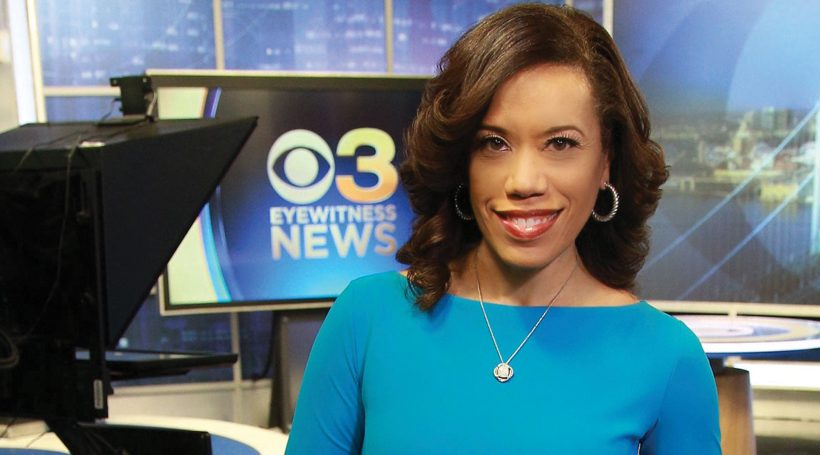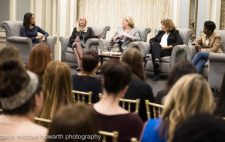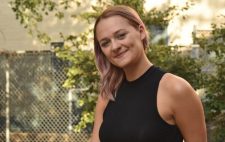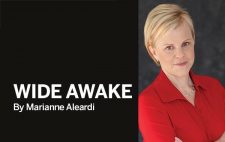Natasha Brown, co-anchor of CBS3’s 4 pm newscast, has covered almost every news story you can imagine during her 17 years at the station: the Bill Cosby sentencing, Pope Francis’ visit, presidential campaigns, you name it. She’s addicted to the adrenaline rush that comes with live TV – being smooth, smart and poised when the camera’s on her.
But then there are the stories that remind her how the ability to open viewers’ hearts is another reason she got into the business. A recent story about a wheelchair-bound 11-year-old boy meeting Carson Wentz, his hero, was just that. Giovanni Hamilton, who has a rare genetic muscle and bone disorder, cried as he met Wentz during Eagles training camp. It was a viral moment that captured the hearts of millions of viewers nationwide. Before the day was done, it was Wentz who was calling Giovanni inspiring. The boy’s subsequent visit to the CBS 3 studio gave Brown the same vibe.
“One of the quotes Giovanni left me with was, ‘Happiness is a choice, and I choose to be happy,’” she says. “He’s got a genetic disorder, he’s always in pain, he’s had surgeries, but he’s an 11-year-old with an infectious smile and he left me with words of wisdom. Those are the kinds of stories that make your day.”
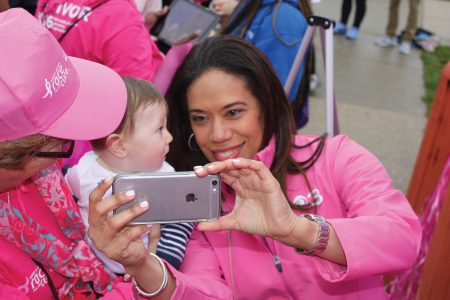 Brown, who spoke as a panelist for SJ Mag’s Women’s Empowerment Series last month, has enjoyed covering human-interest stories since she ascended to CBS 3’s co-anchor slot in August 2018, where she shares airtime with veteran Ukee Washington and Alexandria Hoff. She previously anchored the weekend evening editions of Eyewitness News on CBS 3 and The CW Philly.
Brown, who spoke as a panelist for SJ Mag’s Women’s Empowerment Series last month, has enjoyed covering human-interest stories since she ascended to CBS 3’s co-anchor slot in August 2018, where she shares airtime with veteran Ukee Washington and Alexandria Hoff. She previously anchored the weekend evening editions of Eyewitness News on CBS 3 and The CW Philly.
The hourlong format has a laid-back setting more like that of a network morning news show. Brown and her co-anchors interview guests on a semicircular black leather couch as well as doing segments while standing at a round glass table with the CBS logo, talking about their stories and engaging in banter.
“I love the fact that the 4 pm show is a little looser format,” Brown says. “There’s lots of news, but there’s also opportunities to be more conversational, have more guests. I love that part of it. It allows you to shine. I can definitely show a little more personality.”
The presence of African American females on the news set is more common now than in previous generations of broadcasting, but their share of overall slots in the industry is still small. Brown says she doesn’t take the opportunity to serve as a role model for granted.
“There’s always a thought of being a representative of your community,” Brown says. “There’s definitely a responsibility in that. I take that seriously.”
Brown says she’s proud that her honors span both her work and her place in the African American community. She’s received three Emmys and a 2016 induction into the Broadcast Pioneers of Philadelphia’s Hall of Fame. In addition, the Philadelphia chapter of the NAACP has named her to its “Most Influential Black Women” list twice, and she’s an avid volunteer in supporting the station’s efforts for Susan G. Komen for the Cure, hosting the organization’s annual “Sisters for the Cure” workshop for African American women. She also serves on Komen’s board of directors.
Brown never really had the uncertainty that many do as far as her career. Growing up in a small town about 20 minutes outside of Charlottesville, Virginia, she had known since eighth grade that she wanted to do exactly what she’s doing now.
“I’d practice in front of the mirror, reading the newspaper or magazine and pretending I was the next best news anchor on the air,” she says.
Because her family traveled to Washington a lot, she had the fortune to frequently watch a pair of veteran black female anchors, Andrea Roane and Maureen Bunyan, on the city’s local TV stations, imprinting on her that her dreams were possible.
“That meant everything as a little girl to see them so poised and so intelligent and sophisticated, and they were letting you know what happened in the world,” Brown says. “African American anchors were a rarity, so that was even more inspiring to me.”
Her career has taken her on several stops, starting in Myrtle Beach, South Carolina, before stints in Richmond, Virginia, and Pittsburgh. On Sept. 11, 2001, she was with Pittsburgh’s WPXI-TV and was sent to Shanksville, Pennsylvania, nearly two hours away, to report from the crash site of Flight 93. Reporters weren’t allowed near the wreckage, but the moment really sank in when she was assigned to cover the crash’s anniversary, after the memorial had been constructed. She realized then she was reporting on hallowed ground.
Brown came to CBS 3 as a general assignment reporter in December 2002 and, in her mind, best showed her chops when Bill Cosby was sentenced last year. With the uncertainty about the verdict, there was only so much preparation she could do.
“It was a huge moment,” she says. “I’m on there by myself, talking through, waiting for reaction at the courthouse, just ad libbing. It really tests your skills at that point. It’s just you.”
Brown says the region has captured her heart like no other.
“When they love you, they love you, and when they don’t, they don’t,” Brown says. “But if you strike a chord, you
know it.”


